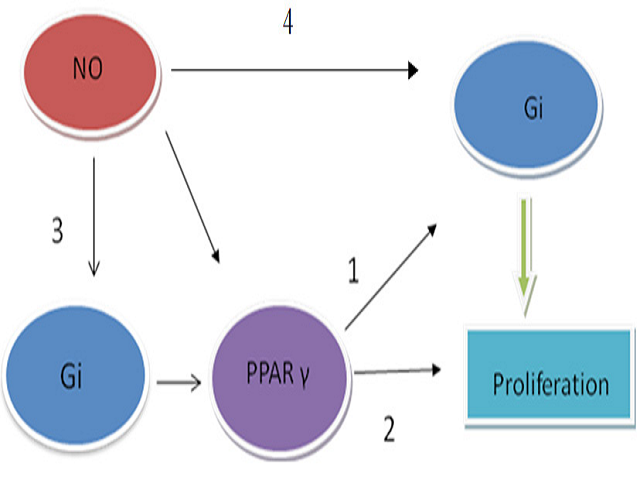Nitric Oxide and Inhibition of PPAR Gamma Regulate the ANG II induced VSMC Proliferation: Relationship with Gi Protein Levels
DOI:
https://doi.org/10.5530/fra.2018.1.8Keywords:
Nitric Oxide, Giα, Angiotensin, Vascular Smooth Muscle Cells, Oxidative Stress, PPAR-γAbstract
Cardiovascular diseases are, nowadays, viewed as the major cause of morbidity and mortality. They are due to complications from hypertension, thrombosis, thermogenesis, and Restenosis. In these pathologies, increased Vascular Smooth Muscle cells (VSMCs) hypertrophy, migration and proliferation promote their onset and progression. Furthermore, Nitric Oxide (NO), a vasoprotective molecule was shown to decrease the levels of inhibitory G alpha-protein (Giα) in VSMCs, thus indicating their possible involvement in its anti-proliferative effects. Peroxisome Proliferator Activated Receptors gamma (PPAR-γ) is linked to both NO and G-proteins. Objective: Establish that the anti-proliferative role of NO in VSMCs is mediated by decreased Giα while investigating the role of PPAR-γ as a modulator of these effects. A-10 cells and VSMCs were incubated with the NO donor sodium nitroprusside (SNP) and/or the PPAR-γ antagonist GW9962 (20 μM and 30 μM). Methods: Cellular proliferation was assessed by a cell proliferation assay, and Giα and PPAR-γ expression were assessed by western blotting. Results: SNP and GW9962 resulted in decreased expression of Giα-2 and Giα-3 by 50% with no difference between individual and combination treatments. SNP had no effect on PPAR-γ activation; whereas GW9962 increased PPAR-γ inactivation by 30- 70%, with combination treatments having no effect. Furthermore, SNP and/or GW9962 following stimulation with ANG II showed that they decrease the proliferation of VSMCs by21.57%, 23.33%, and 27.54%. Combination treatments didn’t indicate an interaction between PPAR-γ and NO. Conclusion: these results show that NO and GW9962 may independently inhibit VSMCs proliferation and decrease Giα protein levels.
Downloads
Metrics





